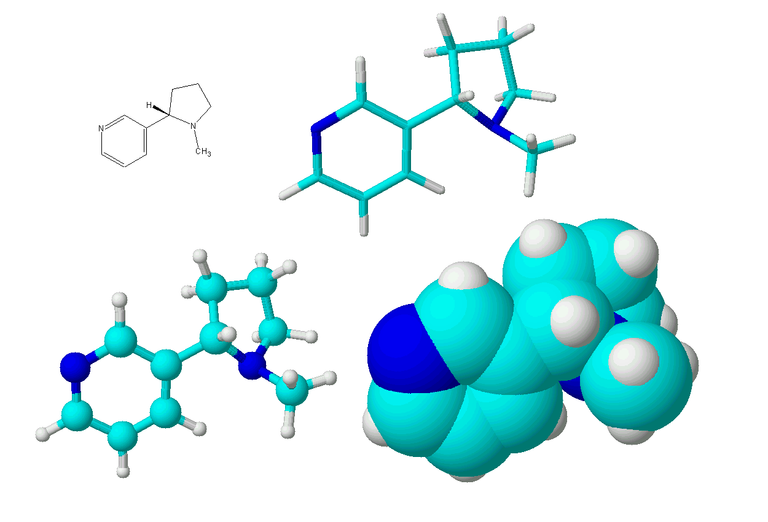Nicotine: Understanding its Grip on the Body
There was a time when every restaurant and bar were filled with smokes from cigarette, although we do not have people doing that in recent times but there was a time when smoking became a culture. In recent times, smoking has reduced as a result of bans by restaurants and public places on it, coupled with the use of vapes around town by people who see it as a better alternative to holding cigarette In all of these things, there is a compound that holds addiction very high, and that substance is Nicotine.
You have heard of nicotine, and you have been told how bad it is even when you have not experienced it first hand, but then you ask yourself why people are still hooked to it even when they know that it is dangerous. You must have also heard some people say that quitting smoking is more difficult than quitting heroine and you begin to wonder how possible that is, well to understand that, you would have to read to the end.
Compared to other substances, nicotine doesn't look like it does much harm seeing that people who smoke do not look high often after taking a cigarette, and you want to also have a taste of nicotine. You do not need to bother about holding a cigarette to have a taste of nicotine as people can ingest nicotine without smoking cigarette because nicotine can be found in smokeless tobacco products including chewing tobacco and so on. But let's not go for that, let's stick to what happens to the body after smoking cigarette?
Along with the smoke, nicotine goes straight to the lungs, after which it is absorbed into the pulmonary circulation. Nicotine when ingested is in its alkaline state and since it is non iodized, it can cross through barriers in the body and even the brain. Nicotine goes to the arteries where it spreads to other parts of the body then goes to the brain where it begins to find nicotinic cholinergic receptors (nAChRs). When nicotine binds to these receptors, it allows sodium, potassium, and calcium to pass through. If nicotine didn't bind to the nicotinic cholinergic receptors (nAChRs), the receptor usually binds to acetylcholine which is a neurotransmitter that is associated with learning, alertness, attention, and memory.
The fact that nicotine has similar shape to acetylcholine is why it can come with awakeness, memory, attention, and increased concentration, but this is only in adults but not in children and teenagers because that part of their brain is just developing, leading to stunted memory, and focus in adulthood. Come to think of it, about 8 million people die of tobacco use every year so I do not think tobacco use is a good idea.
When nicotine binds to the receptors, it allows the gate to open allowing sodium and calcium to flood to the neurons thereby releasing transmitters such as dopamine, and so on. While nicotine can be a stimulant, it can also be a depressant. When nicotine hits the adrenal glands, which produces hormones such as cortisol, adrenaline, dopamine, and testosterone, allows the adrenal gland to produce more adrenaline which causes increased blood pressure, heart rate, and rapid breathing. When adrenaline is increased on a regular artificially, it changes the stress level leading to increased level of stress but the sedative effect comes from a combination of dopamine and nicotine hormone beta-endorphins.
Continuous adrenaline production decreases insulin production thereby causing blood sugar level in the body to rise thereby increasing the chances of people developing type 2 diabetes. Nicotine makes the arteries narrow and harder leading to an increased possibility of a heart attack (myocardial infarction), and also skyrockets the chances of having a stroke as a result of blocked arteries. While cigarette smoking has a higher chance of causing cancer, nicotine on its own doesn't cause cancer.
Nicotine's journey through the body unveils its intricate interplay with brain chemistry and physiological processes, offering insights into addiction's multifaceted nature. As society continues to grapple with nicotine addiction, efforts to educate, support, and innovate interventions remain crucial in mitigating its profound impact on public health and well-being.
Post Reference
https://nida.nih.gov/research-topics/parents-educators/lesson-plans/mind-matters/nicotine-tobacco-vaping
https://www.heart.org/en/healthy-living/healthy-lifestyle/quit-smoking-tobacco/how-smoking-and-nicotine-damage-your-body
https://www.ncbi.nlm.nih.gov/pmc/articles/PMC4363846/
https://www.echelon.health/nicotine-the-good-the-bad-and-the-ugly/
https://www.medicalnewstoday.com/articles/240820
https://www.ncbi.nlm.nih.gov/pmc/articles/PMC3859972/
https://my.clevelandclinic.org/health/articles/24568-acetylcholine-ach
https://www.sciencedirect.com/topics/medicine-and-dentistry/nicotinic-receptor
https://ourworldindata.org/smoking
https://www.cancerresearchuk.org/about-cancer/causes-of-cancer/smoking-and-cancer/is-vaping-harmful
https://www.ncbi.nlm.nih.gov/pmc/articles/PMC4553893/
https://pubmed.ncbi.nlm.nih.gov/10540594/
https://www.cdc.gov/tobacco/campaign/tips/diseases/diabetes.html
https://www.c-span.org/video/?2611-1/surgeon-generals-report-smoking-nicotine-addiction
https://adf.org.au/drug-facts/nicotine/



Thanks for your contribution to the STEMsocial community. Feel free to join us on discord to get to know the rest of us!
Please consider delegating to the @stemsocial account (85% of the curation rewards are returned).
Thanks for including @stemsocial as a beneficiary, which gives you stronger support.
As a person who's trying to quick smoking, I have to say, nicotine is a substance truly addictive. I'm being trying to quick smoking for the last year and a half. I'm doing just fine. From 20 cigars daily to no more than just 3....